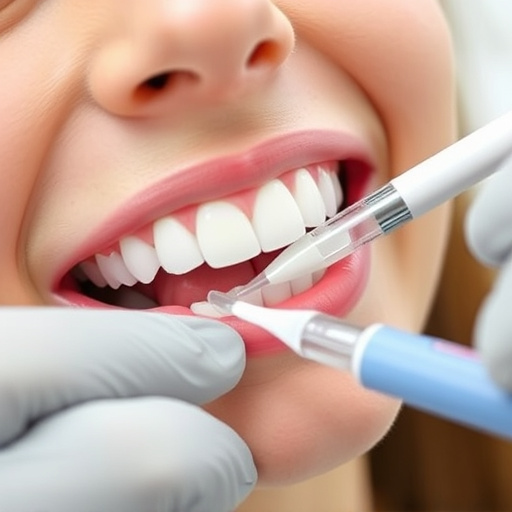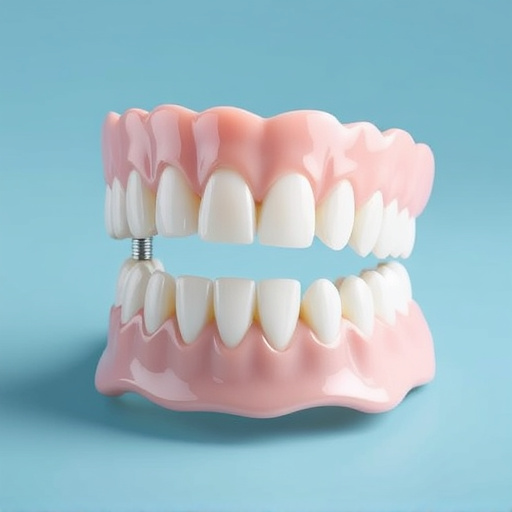Maintaining good dental health maintenance is key to overall well-being. Research highlights a strong dental-cardiovascular connection, showing that oral infections and periodontal diseases increase risks of heart attack, stroke, and atherosclerosis due to systemic inflammation. Regular dental check-ups and proper care, including flossing, brushing, cleanings, fillings, and restorative dentistry, are essential proactive steps to protect teeth, gums, and support heart and brain health by reducing bacterial load and inflammation.
Dental health maintenance isn’t just about keeping your smile bright; it’s a cornerstone of overall well-being, including heart and brain health. This article delves into the surprising connections between your mouth and these vital organs. We explore how dental issues like periodontitis can contribute to cardiovascular disease and the impact on cognitive function, highlighting the importance of preventative measures. Discover daily habits for optimal dental hygiene and the profound benefits they have in supporting not just your teeth, but your heart and brain too.
- The Dental-Cardiovascular Connection
- – Exploring the link between dental health and heart disease
- – How oral bacteria can contribute to cardiovascular issues
The Dental-Cardiovascular Connection

Maintaining good dental health goes beyond a bright smile; it has profound implications for your overall well-being, especially when it comes to heart and brain health. The dental-cardiovascular connection is a fascinating aspect of medicine that highlights the intricate relationship between oral care and systemic wellness. Research suggests that oral infections and chronic periodontal diseases can increase the risk of cardiovascular issues such as atherosclerosis, heart attack, and stroke.
Periodontitis, a severe form of gum disease, has been linked to elevated levels of inflammatory markers in the body. These markers are associated with not only dental issues like tooth repair or extractions but also contribute to cardiovascular problems. In fact, studies indicate that individuals with poor oral health may have a higher chance of developing hypertension and other heart-related conditions. Understanding this connection underscores the importance of regular dental check-ups and proper dental health maintenance as a proactive step towards supporting not just your teeth and gums but also your heart and brain.
– Exploring the link between dental health and heart disease

Maintaining good dental health goes beyond a bright smile; it’s closely tied to overall well-being, including heart and brain health. Research has revealed a surprising connection between oral care and cardiovascular disease. The mouth acts as a gateway to the rest of the body, and issues within it can impact other systems. For instance, gum diseases, often overlooked, are linked to an increased risk of heart attacks and strokes. These conditions cause inflammation in the mouth that, if left untreated, can travel throughout the body, affecting blood vessels and potentially leading to serious cardiac events.
Dental health maintenance plays a crucial role in preventing such complications. Regular check-ups with a general dentistry professional enable early detection of gum diseases and other oral issues. Restorative dentistry procedures, including tooth repair, can not only enhance smile aesthetics but also contribute to overall health by restoring proper chewing function and addressing structural problems that might compromise heart health. By prioritizing dental care, individuals take a proactive step towards ensuring the well-being of their hearts and brains.
– How oral bacteria can contribute to cardiovascular issues

Oral bacteria, often overlooked, can play a significant role in our overall health, particularly when it comes to cardiovascular well-being. Research suggests that the connection between dental health and heart disease is not as trivial as it might seem. The bacteria present in our mouths, especially those associated with periodontal diseases like gum inflammation and tooth decay, can enter the bloodstream through various means, such as during routine activities or procedures like wisdom tooth removal. Once in the bloodstream, these oral bacteria have been linked to increased risks of atherosclerosis (hardening and narrowing of arteries), heart attacks, and even stroke.
This pathway is thought to involve a process where bacterial products trigger an inflammatory response in the body, leading to oxidative stress on blood vessels. As a result, plaque buildup can occur, contributing to cardiovascular issues. Fortunately, dental health maintenance practices like regular flossing, tooth brushing, and professional cleanings, as well as procedures such as tooth repair or cosmetic fillings, can help mitigate these risks by reducing bacterial load and inflammation in the mouth, thereby supporting not only oral but also heart and brain health.
Maintaining optimal dental health goes far beyond a bright smile; it’s a key component of overall well-being, including heart and brain health. By prioritizing regular check-ups and proper oral care, individuals can reduce the risk of cardiovascular diseases and cognitive decline. Integrating dental health maintenance into our routines isn’t just about aesthetics; it’s a proactive step towards a healthier, happier life.














